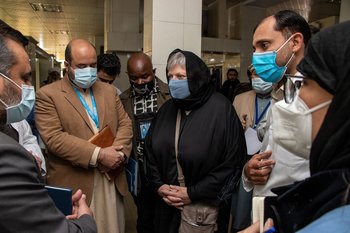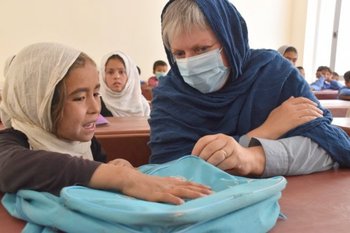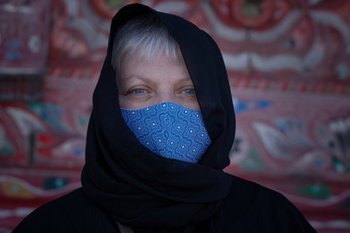Following the Taliban takeover in Afghanistan six months ago, we have seen sanctions halting money flows to the country, heard of women and girls' rights being curtailed and witnessed a country facing famine.
Isabelle Moussard Carlsen, Head of OCHA in Afghanistan, speaks to our Acting Director Juliet Parker about her work, the concurrent crises in the country and the importance of female leaders in the humanitarian sector.
You recently took up the role of Head of Office for OCHA in Afghanistan. Can you tell us what that role entails?
The job is pretty varied: as is often the case in our sector, no one day looks like another. Each brings its own challenges and its own interesting interaction with people. Currently, the most challenging part of the role is interacting with the Taliban as the current de facto authorities to ensure that messages are passed on and that dialogue is happening. I also feel privileged to work with other humanitarian actors who stayed and committed to deliver in this context, especially our national partners – the challenge for them is even greater.
Another important part of my work is the management of a very large OCHA team – over 100 people. Many of them are working in the field in very, very important roles for coordination. That is another great privilege, to manage a team of multicultural, diverse and fascinatingly interesting professionals.
I took the position before the context in Afghanistan changed last year. It greatly impacted my daily work as well as OCHA’s role in the context and how our team positioned themselves.
As OCHA we are a convener and a coordinator. We serve the people of Afghanistan through the different humanitarian actors in the country: the UN agencies, national NGOs and international NGOs.

"I also feel privileged to work with other humanitarian actors who stayed and committed to deliver in this context, especially our national partners – the challenge for them is even greater". Photo credit: OCHA Afghanistan
That’s a lot of different actors to bring together towards a common goal. Our work is about ensuring that the different humanitarian systems are functioning fluidly so that the qualities of each actor play out into the best possible response for the people of Afghanistan.
It’s about ensuring everyone has the correct information, the different actors are talking to one another, that the conversation includes voices who are slightly different, like the Red Cross, ICRC and MSF, and that they can all agree priorities – all while keeping their own identity and specific roles. Part of our job in this context is to communicate the humanitarian principles to the de facto authorities and ensure there is an understanding of who we are as humanitarian actors.
You were brought up in Afghanistan as part of your childhood, what was it that drew you back there at this stage in your career?
It was more a decision to go back to the field after 16 years of HQ roles. I always said I would return to the field after my children grew up. It was personally important for me to return to the interaction with people, the connection with reality, the deep understanding of one single context and the difference you can make at field level.
When I applied it wasn't obvious that it would be Afghanistan, so it was an incredible surprise. Coming back after all these years is quite unique because, although moving away from 30 years of NGO work was a challenge, I had this grounding in terms of the context. I have a very deep familiarity with my environment in Afghanistan. I have felt very much at home which helped me learn and integrate into a new organisation.
Women are still in the minority in senior positions within the humanitarian sector. And you've been in a leadership position for many years now. What are your reflections on the particular challenges and opportunities of being a woman in these senior roles?
Here in Afghanistan there's actually quite a lot of women in leadership both in UN agencies and in NGOs, including very strong, dedicated Afghan women who have a voice and who want that voice to be heard. These women have stayed and delivered and shown leadership, not because they are women but because they have the influence and ability to make decisions for their teams, for their organisations, and for themselves in a context that is perceived as very hostile. It’s wonderful to be able to sit down with them and see how they can be supported. It makes for a very interesting dynamic.
As a woman in these positions, you still have this constant question about legitimacy and about the space you’re given to have a voice. We still see settings where men take over the conversation and explain what should be done. Very often, women are much more quiet in their ways of leading and assessing and sharing, so we are not heard the way we should be, and we hold some responsibility for that. We have to demand to be heard, to give ourselves the licence to be more vocal. And the legitimacy that we have? We should never question it. But we always do, even though we work very hard to be where we want to be. The larger community needs to understand this, but we must not self-censor, myself included.
We must also make conscious decisions to give younger professional women a chance, especially in a setting like Afghanistan where we aren’t doing well with the ratio of national women in our teams. How do we change that? How do we at least bring them to the process, and if possible, to successful recruitment?
We must also make conscious decisions to give younger professional women a chance, especially in a setting like Afghanistan where we aren’t doing well with the ratio of national women in our teams. How do we change that? How do we at least bring them to the process, and if possible, to successful recruitment? There are a lot of ways of doing that: the way you advertise, making sure shortlists have a number of women on them. We must ensure that everyone is recognised for their own competencies.
We’ve seen restrictions imposed and girls’ education severely curtailed. What effect has this had on the population?
The impact on women and girls is a key subject when it comes to the Taliban taking over and setting up as de facto authorities. However, it’s important to say that the conversation is a lot more complex than what we often see in the media. Education has been a key area of progress in the past 21 years of development programming in Afghanistan, but even then, the numbers of children in school – boys and girls – were not where they should have been. A lot of schools have been destroyed by conflict. Now that we have access to more of the villages and districts that have been out of reach for many, many years, we have observed that schooling was worse than feared, even for boys.
A lot of Afghanistan’s urban population is very traumatised by what happened on the 15 August 2021. Now, these different measures are illustrating everyone’s worst fear. But I believe things will evolve, that there’s a real willingness for dialogue. We are hopeful that the commitments to reopen all schools for all students after the winter break will actually happen. There are a lot of challenges to that, but I want to trust that it will.
What part has OCHA played in addressing or alleviating issues of women’s rights?
As OCHA, one of the first very big concerns that we have been monitoring since day one, was that female humanitarian actors – international and national – could continue working in their roles. There are some very active, powerful women’s leaders in Afghanistan’s NGO sector, so it was a big worry that women’s work would be limited. The first couple of weeks were very difficult but after a lot of dialogue and negotiation, the space reopened progressively. These are local negotiations, not the whole of Afghanistan, but this has been one of our key advocacy points.

"We must praise the Afghan teams who stayed and worked in the hospitals and health centres without salary month after month, week after week, day after day to maintain some service for the people – but they had nothing. Humanitarian actors had to make a decision to take on responsibility for funding and support essential services in order to stopgap the catastrophe that was unfolding". Photo credit: OCHA Afghanistan
It's less about humanitarian actors having access to women, but about vulnerable women having access to humanitarian aid. Culturally, we can’t do this with a male-only team because men will not be able to speak to these women. We need Afghan women in our teams to ensure that the most vulnerable in this country – including women without a male in the family, or women in the regions with the more dire humanitarian crises – have access to humanitarian aid and that their voices can be heard. That is the important thing and how we frame it with the de facto authorities.
What are your observations about the situation in the current humanitarian response?
It’s the largest humanitarian plan ever for a single country. That says a lot about the situation. We have an entire country in IPC three and four and the humanitarian community is very ambitiously aiming to reach 24.4 million people. For context, in 2020 the aim was 11 million, and we also had a massive development programme at the time.
Prior to 15 August, the situation in Afghanistan was already very dire. We faced massive displacement and conflict, we had COVID like everyone else and we had the second drought in three years, but we also had that massive development programme. Now, we need to stop and consider how that development programme was set up, because on 16 August, it all stopped.
The whole architecture stopped being funded, salaries stopped, supplies stopped, everything. The humanitarians were the only players left in town and we saw the entire structure collapse in front of our eyes. We must praise the Afghan teams who stayed and worked in the hospitals and health centres without salary month after month, week after week, day after day to maintain some service for the people – but they had nothing. Humanitarian actors had to make a decision to take on responsibility for funding and support essential services in order to stopgap the catastrophe that was unfolding.
But preparing for this humanitarian plan was very, very complex. Humanitarians do not work in a vacuum, we use specific methods because we know there are other systems functioning. When there are no basic services anymore, when all the development activities have stopped, how does humanitarian activity plug itself in? It’s like driving an ambulance full of patients but there’s no hospitals left to take the patients to. Alongside this situation, is the economic crisis. The money coming into Afghanistan suddenly stopped, then came the sanctions and the impact on banking, cash and liquidity. You have all the worst aggravating factors together at one time in one country.
When there are no basic services anymore, when all the development activities have stopped, how does humanitarian activity plug itself in? It’s like driving an ambulance full of patients but there’s no hospitals left to take the patients to.
The first outcome of this is the Humanitarian Response Plan (HRP) which is really the humanitarian mandate as it is today, another is to look at how to maintain essential services. It will be critical to follow how these two things will function together. Then there was the UN Security Council Resolution (2615) in December providing humanitarian exemptions wide enough to allow us to work. But it's still going to remain an extreme challenge to deliver the humanitarian response plan as it is, because every single humanitarian actor is impacted by those different challenges.
What do you see as the key learning that the humanitarian system needs to take away from the past 20 years of aid in Afghanistan?
Like in all protracted crises where humanitarian aid is delivered, the lessons learned could be endless. There is an enormous lesson around what has happened in terms of development and humanitarian aid structures.
Then there are the conversations you hear about “not losing the gains”. I sometimes think we need to ask ourselves “What gains?”. Even before 15 August, Afghanistan was one of the worst countries to be a woman, and that’s after 20 years of massive development programming. Humanitarian approaches were geographically very urban and very limited because territory held by other armed groups wasn’t accessible.
It is true that urban populations have had access to education and to a different life than they had 20 years ago, but if you look at their brothers and sisters in villages you don’t see that. Since August, OCHA and other agencies have moved into some areas that haven’t seen humanitarian aid in 12–15 years. In a hospital in Herat I saw Therapeutic Feeding Units and malnutrition treatment units. It was horrifying to see the number of children coming in each day, and also to see the state of their mothers. I spoke to one 24-year-old woman who was so severely malnourished she could barely stand. She had never been to school nor had access to health care for a very long time. Many of her 6 children had already passed away and she was only here with her last born because it was finally safe to travel. This isn’t a unique case. That’s when one questions what has happened in the past 20 years.
If you had a message to relay to colleagues across the humanitarian sector about the scale of need and response for Afghanistan, what would it be?
First, the people of Afghanistan cannot be abandoned. It’s going to be very political and very complex. There’s going to be a need for a lot of dialogue, but we have to stand beside the people. That is key.
The second thing is linked to conversations about localisation and nationalisation. It’s been a very long time since I have thought it was essential to have international staff on the ground, but in this context, presence is protection. It will make the difference in their dialogue with the de facto authorities. This doesn’t question our Afghan colleagues’ capacity nor their ability to deliver, it protects them. It reassures them and gives them the trust to continue the work they are doing.

"...the people of Afghanistan cannot be abandoned. It’s going to be very political and very complex. There’s going to be a need for a lot of dialogue, but we have to stand beside the people. That is key". Photo credit: OCHA Afghanistan
Third, as a humanitarian community, we've been hit hard in the last couple of years during the pandemic. We’ve lost a lot of courageous humanitarian workers and our appetite to deliver and to be present in those complex, hostile environments has diminished tremendously. We need to consider what this means and what is says about our ability to do the work. How do we continue to deliver principled humanitarian aid? How do we scale up when we need to? Can we do that in a timely and qualitative manner? These concerns are true for Afghanistan today, but I’m sure they’re also true in a number of other contexts.
Finally, how do you remain able to keep delivering for others in such a tough operating environment? What is it about Afghanistan that keeps you resilient?
You have to look after yourself. You do the things that make you feel good and keep you healthy. Personally, what has always made the difference is that this is my life. This is what I do. I can’t see myself doing anything else and that’s where I get my energy from. It is incredibly rewarding to serve the people of Afghanistan at this time in their history. I think that’s it. That’s who I am.